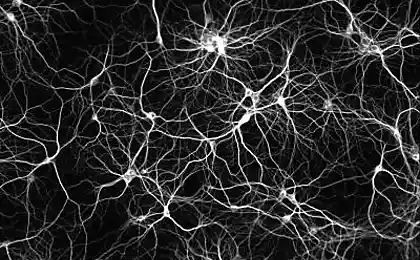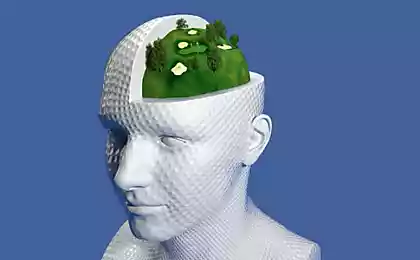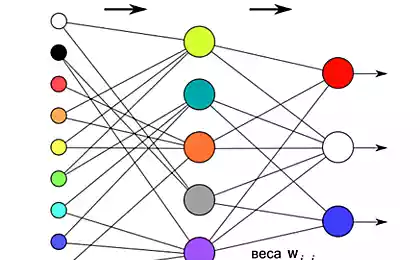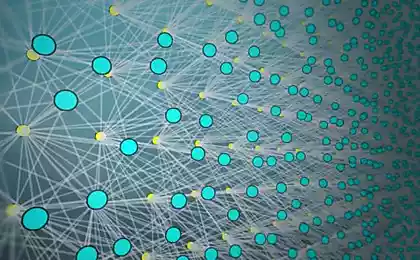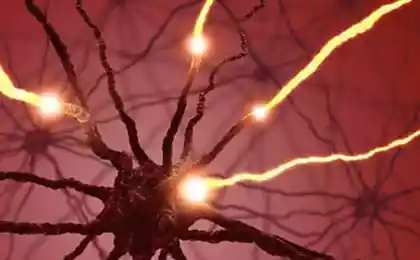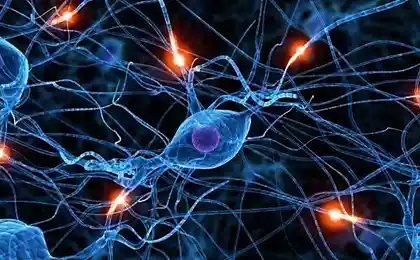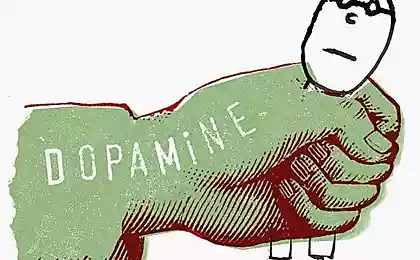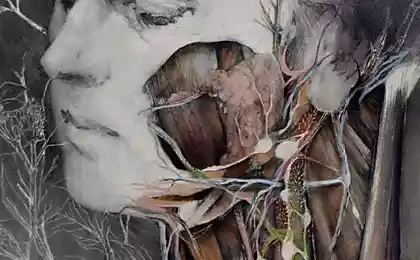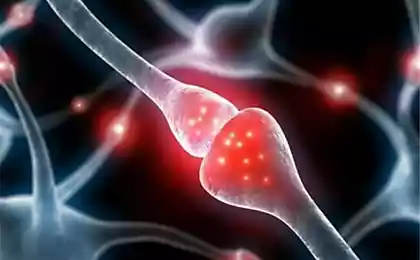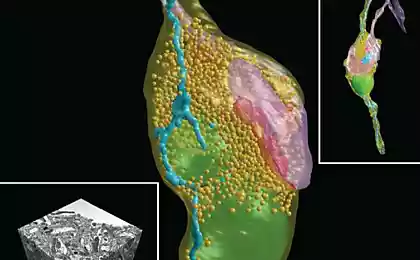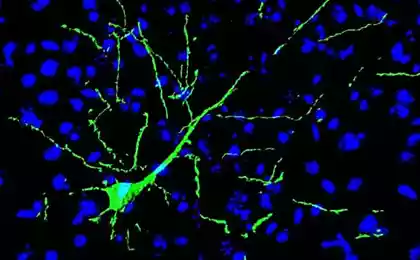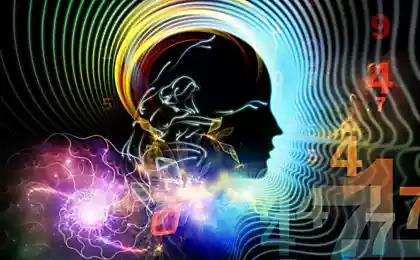516
Brain memory with new nerve cells
The neurons generated as a result of neurogenesis, may play in the brain a dual role: on the one hand, they improve the memorization of new information, on the other – help to forget what the brain remembered before.
Memorization of information is accompanied by formation of neuronal contacts in the brain. These contacts, called synapses, create new neural chains, which are believed to serve as a kind of memory cells. Hence, we can conclude that the more synapses, the memory is better if the synapses disappear, and memory is getting worse.
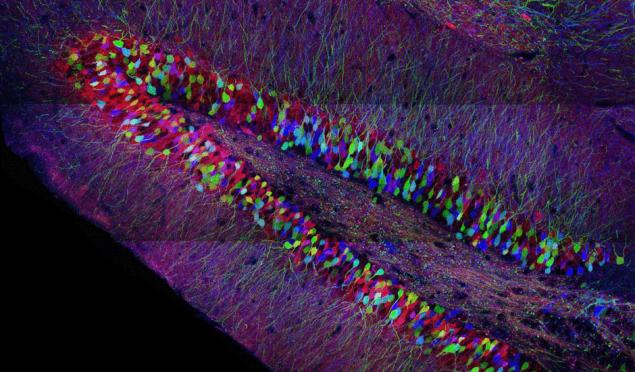
What may disappear synapses? First, it may be the will of the cell and under the influence of her other contacts – wanting to optimize your work, the neuron is refusing some connections in favor of others. Secondly, it is clear that synapses disappear with the death of the nervous cells, which again will be accompanied by a deterioration of memory. Numerous clinical observations confirm this: mass extinction neurons, which occurs either due to brain injury, either due to some severe disease, leads to the fact that the individual loses the ability to learn and forget that it ever happened.
If the decrease in the number of neurons harms memory, does this mean that the appearance of new neurons should stimulate it? At first glance, Yes, but it turned out that not everything is so simple: researchers from the University of Toronto found that new nerve cells are sometimes, on the contrary, helping the brain to forget the accumulated to this information. The emergence of new nerve cells is called neurogenesis, and now we have, as you know, in addition to the usual neurogenesis associated with the growing, evolving brain, there is another, ongoing life. Thanks to the "adult" neurogenesis in humans every day, about 700 new nerve cells, which are embedded in the nerve chain of the dentate gyrus of the hippocampus. This area of the brain, the hippocampus, is one of the major memory centers, so it would be logical to expect that the emergence of new nerve cells makes the memory even better. Indeed, experiments on mice showed that suppression of neurogenesis impairs the ability of animals to learn: in particular, they cease to feel and to remember differences between similar conditions and situations. On the other hand, if in rodents, the neurogenesis stimulated, the animals quickly learned the new information, so that they better navigate the terrain and perform behavioral tests.
But a few years ago Paul Frankland (Paul Frankland) and his colleagues from the University of Toronto found that animals with a stimulated neurogenesis worse start to do some tasks – in particular, those for which you had to remember some details from past attempts. The results of the experiments were too intriguing to simply forget about them, and the researchers decided to study this phenomenon in more tightly. In the new experiments, the scientists decided to experiment not only with adult neurogenesis, but also with ordinary, which begins during fetal development and ends shortly after birth. This normal neurogenesis has its own dynamics: for example, in newborns the appearance of new neurons in the brain is accelerated, but soon the intensity of this process greatly decreases. On the other hand, there is such a thing as a baby (infantile) amnesia is when the brain disappears the memory of what had happened to us up to 2-4 years. And so the researchers thought to check if it was linked to childhood amnesia with neurogenesis flash in the brain of the newborn, which, fortunately for experimentalists, as occurs in humans and in mice.
For starters, scientists figured out if the mice something similar to human childhood amnesia. For this 17-day mice (which is the level of development can be compared with children under one year of age) were placed for a time in a cage where their weak electrocuted. They were then transferred back to a familiar cage, but over the next six weeks, mice were periodically placed in the "torture chamber". Current while he was not beaten.
It turned out that the young mouse quickly forget negative experiences and caught in a terrible cage, no signs of fear, anxiety, etc. do not show. Their memory was enough for the day, everything that happened before the last 24 hours, the mice were forgotten. But if the same experiment was staged from older mice, they were perfectly memorized that they can wait in electrolyte, and to remember it even a month later.
Then the researchers using the exercise and chemicals stimulated neurogenesis in adult mice. (Nothing complicated – it turns out that the division of nerve cells in the adult brain can whip up, feeding the mice with Prozac, or putting them in the cage squirrel cage). And here, when the intensity of appearance of new nerve cells in adult mice were increased by 100%, their forgetfulness was literally child: adult mice were no longer "keep in mind" negative experiences in the electric cell; they also began worse to perform some task based on the ability to remember.
On the other hand, the researchers tried to slow down neurogenesis in newborn mice and see what happens. This was not an example more difficult: it took genetically to rebuild the cells of the predecessor neurons to start the self-destruct sequence and they were unable to turn into active neurons. To slow down the emergence of new nerve cells in mice was only 50%, but even so, their behavior were very similar to the behavior of adult mice – in the sense that the memory of mice lasted for 24 hours and a week. The results of the experiments, the authors published in the journal Science.
Of course, a great temptation to extrapolate these data to humans, but you've got to understand that the experiments were made on mice, and just like their results on the human brain will not spread. The need for special studies, special experiments involving, so to speak, of the human brain, to understand whether such a mechanism we have and how great his contribution to the process of remembering-forgetting. If such a forgetting mechanism works in humans, then we may get an additional tool to manage our memory will only need to learn to speed up or slow down neurogenesis. Incidentally, during the depression, the neurogenesis is weakening, and with this is associated the effect of antidepressants (including Prozac)? These drugs, among other things, stimulate the formation of new neurons, memory this is changing, and the negative memories that contribute to depression can just disappear.
However, there is still need more to explore processes that occur in memory with the appearance of new cells. Why the new cells help to "wipe" some information? Look again at the synapses: new cells form new neuronal connections, new chain, and it is well known that an excess of synapses, neural circuits excess is bad for the brain, and the brain itself holds a lot of work inside to get rid of excess intercellular connections. Extra neural circuits, for example, often seen in autism and other similar diseases. It is possible that the appearance of these extra circuits in the course of moderate, controlled and strictly metered by the brain's neurogenesis helps the brain to get rid of unnecessary information.
Source: nkj.ru
Memorization of information is accompanied by formation of neuronal contacts in the brain. These contacts, called synapses, create new neural chains, which are believed to serve as a kind of memory cells. Hence, we can conclude that the more synapses, the memory is better if the synapses disappear, and memory is getting worse.

What may disappear synapses? First, it may be the will of the cell and under the influence of her other contacts – wanting to optimize your work, the neuron is refusing some connections in favor of others. Secondly, it is clear that synapses disappear with the death of the nervous cells, which again will be accompanied by a deterioration of memory. Numerous clinical observations confirm this: mass extinction neurons, which occurs either due to brain injury, either due to some severe disease, leads to the fact that the individual loses the ability to learn and forget that it ever happened.
If the decrease in the number of neurons harms memory, does this mean that the appearance of new neurons should stimulate it? At first glance, Yes, but it turned out that not everything is so simple: researchers from the University of Toronto found that new nerve cells are sometimes, on the contrary, helping the brain to forget the accumulated to this information. The emergence of new nerve cells is called neurogenesis, and now we have, as you know, in addition to the usual neurogenesis associated with the growing, evolving brain, there is another, ongoing life. Thanks to the "adult" neurogenesis in humans every day, about 700 new nerve cells, which are embedded in the nerve chain of the dentate gyrus of the hippocampus. This area of the brain, the hippocampus, is one of the major memory centers, so it would be logical to expect that the emergence of new nerve cells makes the memory even better. Indeed, experiments on mice showed that suppression of neurogenesis impairs the ability of animals to learn: in particular, they cease to feel and to remember differences between similar conditions and situations. On the other hand, if in rodents, the neurogenesis stimulated, the animals quickly learned the new information, so that they better navigate the terrain and perform behavioral tests.
But a few years ago Paul Frankland (Paul Frankland) and his colleagues from the University of Toronto found that animals with a stimulated neurogenesis worse start to do some tasks – in particular, those for which you had to remember some details from past attempts. The results of the experiments were too intriguing to simply forget about them, and the researchers decided to study this phenomenon in more tightly. In the new experiments, the scientists decided to experiment not only with adult neurogenesis, but also with ordinary, which begins during fetal development and ends shortly after birth. This normal neurogenesis has its own dynamics: for example, in newborns the appearance of new neurons in the brain is accelerated, but soon the intensity of this process greatly decreases. On the other hand, there is such a thing as a baby (infantile) amnesia is when the brain disappears the memory of what had happened to us up to 2-4 years. And so the researchers thought to check if it was linked to childhood amnesia with neurogenesis flash in the brain of the newborn, which, fortunately for experimentalists, as occurs in humans and in mice.
For starters, scientists figured out if the mice something similar to human childhood amnesia. For this 17-day mice (which is the level of development can be compared with children under one year of age) were placed for a time in a cage where their weak electrocuted. They were then transferred back to a familiar cage, but over the next six weeks, mice were periodically placed in the "torture chamber". Current while he was not beaten.
It turned out that the young mouse quickly forget negative experiences and caught in a terrible cage, no signs of fear, anxiety, etc. do not show. Their memory was enough for the day, everything that happened before the last 24 hours, the mice were forgotten. But if the same experiment was staged from older mice, they were perfectly memorized that they can wait in electrolyte, and to remember it even a month later.
Then the researchers using the exercise and chemicals stimulated neurogenesis in adult mice. (Nothing complicated – it turns out that the division of nerve cells in the adult brain can whip up, feeding the mice with Prozac, or putting them in the cage squirrel cage). And here, when the intensity of appearance of new nerve cells in adult mice were increased by 100%, their forgetfulness was literally child: adult mice were no longer "keep in mind" negative experiences in the electric cell; they also began worse to perform some task based on the ability to remember.
On the other hand, the researchers tried to slow down neurogenesis in newborn mice and see what happens. This was not an example more difficult: it took genetically to rebuild the cells of the predecessor neurons to start the self-destruct sequence and they were unable to turn into active neurons. To slow down the emergence of new nerve cells in mice was only 50%, but even so, their behavior were very similar to the behavior of adult mice – in the sense that the memory of mice lasted for 24 hours and a week. The results of the experiments, the authors published in the journal Science.
Of course, a great temptation to extrapolate these data to humans, but you've got to understand that the experiments were made on mice, and just like their results on the human brain will not spread. The need for special studies, special experiments involving, so to speak, of the human brain, to understand whether such a mechanism we have and how great his contribution to the process of remembering-forgetting. If such a forgetting mechanism works in humans, then we may get an additional tool to manage our memory will only need to learn to speed up or slow down neurogenesis. Incidentally, during the depression, the neurogenesis is weakening, and with this is associated the effect of antidepressants (including Prozac)? These drugs, among other things, stimulate the formation of new neurons, memory this is changing, and the negative memories that contribute to depression can just disappear.
However, there is still need more to explore processes that occur in memory with the appearance of new cells. Why the new cells help to "wipe" some information? Look again at the synapses: new cells form new neuronal connections, new chain, and it is well known that an excess of synapses, neural circuits excess is bad for the brain, and the brain itself holds a lot of work inside to get rid of excess intercellular connections. Extra neural circuits, for example, often seen in autism and other similar diseases. It is possible that the appearance of these extra circuits in the course of moderate, controlled and strictly metered by the brain's neurogenesis helps the brain to get rid of unnecessary information.
Source: nkj.ru
In the schools of Uzbekistan introduced green technology
2000-year-old tradition of Ayurvedic treatment is to rinse oil
